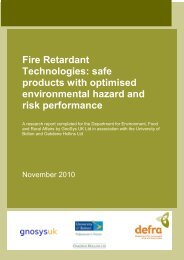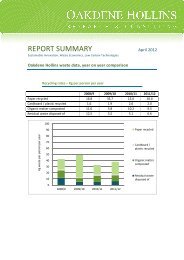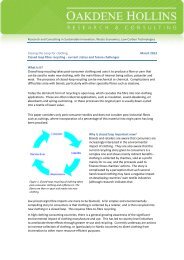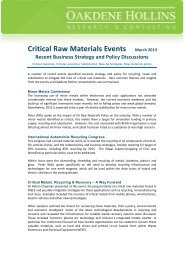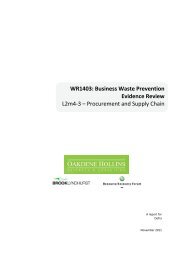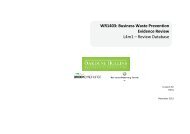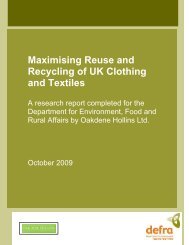Recycling of Low Grade Clothing Waste - Oakdene Hollins
Recycling of Low Grade Clothing Waste - Oakdene Hollins
Recycling of Low Grade Clothing Waste - Oakdene Hollins
Create successful ePaper yourself
Turn your PDF publications into a flip-book with our unique Google optimized e-Paper software.
© <strong>Oakdene</strong> <strong>Hollins</strong> Ltd, Salvation Army Trading Company Ltd<br />
Nonwovens Innovation & Research Institute Ltd September 2006<br />
disrupts the material flow in the industry, significant costs can arise<br />
through additional storage and shipping delays.<br />
Inadequate information concerning prices is also a feature <strong>of</strong> many<br />
recycling markets. Prices <strong>of</strong> textiles are published regularly by MRW but<br />
these show a broad range <strong>of</strong> prices and categories <strong>of</strong> clothing and are not<br />
seen by the industry as being responsive to short term fluctuations in price.<br />
Considerable negotiation and bargaining costs are incurred as a result.<br />
Little evidence could be found <strong>of</strong> the existence <strong>of</strong> contractual relationships<br />
between the charities and the merchants or between the merchants and<br />
their overseas customers. The Recyclatex scheme operated by the Textile<br />
<strong>Recycling</strong> Association is designed to give the operators <strong>of</strong> textile banks, and<br />
the Local Authorities a guarantee that bank materials will be collected, but<br />
prices continue to be based on negotiation and are influenced by market<br />
forces at the time <strong>of</strong> collection.<br />
7.3 Information Failures<br />
Full information flow is an important factor in the successful functioning <strong>of</strong><br />
all markets. The uncertain quality <strong>of</strong> exported used textiles leads to a<br />
number <strong>of</strong> potential problems and encourages rogue operators into the<br />
market to the detriment <strong>of</strong> bona fide merchants. The buyer is taking on<br />
trust the quality <strong>of</strong> the mix <strong>of</strong> clothing within each bag delivered, and this<br />
will vary from bag to bag and from shipment to shipment. Clearly the<br />
heterogeneous nature <strong>of</strong> the product is an issue in many waste streams, but<br />
the remoteness <strong>of</strong> the markets from the shippers makes this a considerable<br />
complication in the export <strong>of</strong> used textiles. This will increase as more and<br />
more merchants attempt to reduce costs by shipping bulk textiles abroad<br />
without prior sorting <strong>of</strong> the material.<br />
Merchants shipping unsorted waste to export markets will, by definition, be<br />
shipping a mix <strong>of</strong> good and marginal quality re‐useable clothing and<br />
materials that are waste and which will require disposal. The greater the<br />
mix <strong>of</strong> low grade items and waste in the shipment, the lower the pr<strong>of</strong>it<br />
margin and the higher the disposal costs for the buyer. Some buyers will<br />
collect at source and this gives them the ability to check quality before<br />
shipment.<br />
For Defra Page 52



